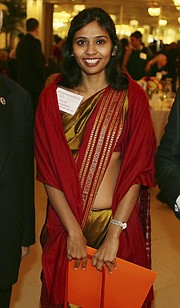"Never, never, never give up" was a mantra heard Saturday at the 10th anniversary of Missouri's Missing and Unidentified Person's Awareness Day.
Missouri's Missing co-founder, Marianne Asher-Chapman, said this was a day to honor her very own daughter, Michelle Yarnell, who went missing in 2007.
At the age of 28, Yarnell disappeared after a domestic violence dispute with her husband. He was eventually convicted and served four years in jail, but Asher-Chapman said her daughter's remains were never found.
"I remember not knowing what to do or where to turn," Asher-Chapman said. "Until it affects your family, you really don't get it."
More than 1,000 missing people are listed on the Missouri Highway Patrol's Missing Persons Clearinghouse, according to a proclamation from Gov. Eric Greitens' office marking June 17 as Missing and Unidentified Person's Awareness Day in Missouri.
The newest name on the list is Desirea Ferris, of Liberty, who went missing in May.
For many families, Saturday was a day for them to meet and greet other families in similar situations and share their stories of hope.
Martha Hamilton, speaker at the event, has a daughter who has been missing since 1965, recorded as the longest registered missing person in the state. Her daughter was last seen at age 2 in Cape Giradeau.
During the event, she reminded the audience if they don't fight for their missing loved ones, answers will never be found and justice will never be served.
In an interview with the News Tribune, Hamilton said without internet or Amber Alerts back then, anyone could slip under law enforcement's radar.
Doug Pearson, private investigator for ACT Now Investigations in Overland Park with three decades of experience, advises families who are committed to the search to be proactive while dedicating a healthy amount of time that allows them to move forward with other things in their life.
"I'm really convinced that there's somebody out there that knows something that we don't know, and that's my thrust," Pearson said. "It helps a lot to be around people who have had similar experiences, but its good to dedicate a set of amount of time to the search that you think is fulfilling so you are able to move forward."
A representative from the National Center for Missing and Exploited Children (NCMEC), a team of retired law enforcement officers who offer to support families with missing loved ones, was present at the event.
Ken Schmelig, former law enforcement officer in St, Louis County and consultant with MCMEC, said if families reach out to them, the organization can help link them with case managers, provide on-site technical assistance to law enforcement and families, as well as help in the distribution of photos and posters of missing children through various methods.
"It's really sad when it happens to the kids, but don't forget it can happen to someone at any age," said Valerie Potter, wife of Timothy Potter who has been missing for 10 years.
Regina Sykes' daughter went missing at the age of 25; Sykes has since founded Looking for an Angel.
She told the audience without the help of Missouri's Missing and her own perseverance with law enforcement, she may have never gotten the closure she needed and deserved.
Her daughter went missing in 2016, and her body was found in March of this year.
"I have to be her voice now," Sykes said. "The more people we can get to share their stories, the more aware people are and willing they are to help you look for people."
Keynote speaker Christine McDonald, an internationally recognized author and a survivor of human trafficking, homelessness and addiction, told the families they were the "remnants of hope."
McDonald explained she was held captive as a victim of sex trafficking for 21 years until she finally found a way to escape.
"No one came looking for me, no one discovered me," McDonald said. "I found my own way out and a glimmer of hope to hold on to."
She said when her friends were murdered, she watched how no one came to claim their bodies, and no investigation was conducted because they were "prostitutes."
"We have created a culture of worthy and unworthy victims in society," McDonald said. "I believe together, if we stand united, we can change the culture of how law enforcement responds to the people we are looking for. But we have to that collectively."


